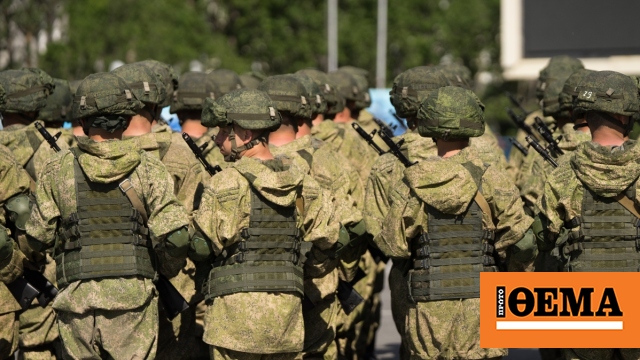
more 50,000 Russian soldiers eThey have now been killed in the war in Ukraineaccording to the BBC.
The second year of the war, and while Moscow While promoting the “meat grinder” strategy, the death toll was 25% higher than in the first year of the war.
The research was conducted by Russian BBCIndependent media group Mediazona and volunteers have counted the deaths since February 2022. New graves at the cemeteries helped provide the names of many soldiers, while open source data from official reports, newspapers and social media were searched.
More than 27,300 Russian soldiers died in the second year of the battle
And according to the results, it's over 27,300 Russian soldiers They were killed in the second year of the war, demonstrating that territorial gains came at a heavy human cost.
the term “Mincer” It has been used to describe how Moscow relentlessly sends waves of troops to try to wear down Ukrainian forces and expose their positions to Russian artillery.
The death toll so far – more than 50,000 – is eight times higher than the only official public acknowledgment of the death toll ever announced by the World Health Organization. Moscow In September 2022. The actual Russian death toll is likely much higher. The analysis does not include civilian deaths in Russia-controlled Donetsk and Luhansk – in eastern Ukraine. If they were added, the death toll on the Russian side would be even higher.
Ukrainians who were killed
Meanwhile, Kiev rarely mentions the number of deaths on the battlefields
In February, President Volodymyr Zelensky He mentioned that 31 thousand Ukrainian soldiers They were killed.
But estimates also based on US intelligence services indicate greater losses.
They had no connection to the army before the invasion
It is also important to note the significant expansion of dozens of cemeteries in the country, in order to bury the dead of the front.
According to a BBC investigation, most of the new graves belong to soldiers and officers killed in Ukraine, while two out of every five soldiers killed are people who had no connection to the country's army before the invasion. Alternatively, when war broke out in February 2022, Russia could have used its professional forces in complex military operations. But many experienced soldiers were killed or wounded.
Prisoners who became Wagner's fighters
Crucial to the success of the meat grinder were newly conscripted prisoners, who, according to the evidence, were killed faster on the front lines.
In June 2022, Moscow The deceased has now been admitted Yevgeny Prigozhin To recruit prisoners from prisons those who wanted to become fighters fought as part of it Wagner Who was acting on behalf of the Russian government. Wagner had a fearsome reputation due to his harsh combat tactics and brutal internal discipline. Soldiers could be executed on the spot when they retreated without orders.
The mercenary organization continued to recruit until February 2023, when its relationship with the Russian regime began to become tense. the Prigozhin He staged a failed rebellion against the Russian armed forces last June and attempted to advance on Moscow, before agreeing to step down. In August 2023, he was killed in a plane crash.
BBC analysis shows that 9,000 Russian prison inmates were killed on the front lines of the war. On average, former prisoners survived the war for three months.
After that, the tactic of recruiting prisoners continued Ministry of Defense. These soldiers lived on average only two months at the front.
Insufficient training
The BBC spoke to me Families of new prisoners who died – and with them soldiers still alive – and who said that the military training given to newly recruited prisoners by Ministry of Defense not enough.
One widow said her husband signed his ministry contract in prison on April 8 last year, and was fighting on the front lines three days later. “I was sure it would be the few weeks of training they were talking about. There would be nothing to fear until at least the end of April,” he added.
Another mother says that she only learned of her husband's transfer from prison to the battlefield when she tried to contact him to inform him of the death of her son, who was also fighting. She says that her son, a father of twins, has never carried a weapon. She was never able to tell her husband, Alexander, about her son's death, as he had been “taken away” to fight, which he learned about through a phone call from another prisoner.
About seven months after her son's death, the woman learned that her husband had also died.
“Be prepared to die”
Prisoners who were previously recruited Wagner They were usually contracted for six months. If they survived, they were offered their freedom.
But from last year September, According to the Department of Defense, conscripted prisoners must fight until they die or until the war ends – whichever comes first.
According to the BBC, there are stories of prisoners asking their relatives to help them buy suitable uniforms and shoes. There have also been reports of prisoners being sent to fight without proper equipment, medical supplies or even a Kalashnikov.
“Many soldiers had rifles that were unfit for combat,” Russian pro-war activist and blogger Vladimir Grobnik wrote on his Telegram channel, claiming that commanders found some weapons to be “completely out of order” and impossible to replace.
today's news:
Today's strike without metro, electricity, trams and trains – how will buses, taxis and traffic systems move in the center
The Miracle of Kasellakis with the “Cross of Oil at Baptism” and the thanksgiving of Georgiadis and Polakis' points
Council of State: Change of surname upon the “disappearance” of the father

“Hipster-friendly coffee fanatic. Subtly charming bacon advocate. Friend of animals everywhere.”





More Stories
He is the “Hitler of our time.”
Woke Agenda: Infuriates Elon Musk, Burns Politicians, Targets the Secret Service
Panic after steam explosion in Yellowstone Park